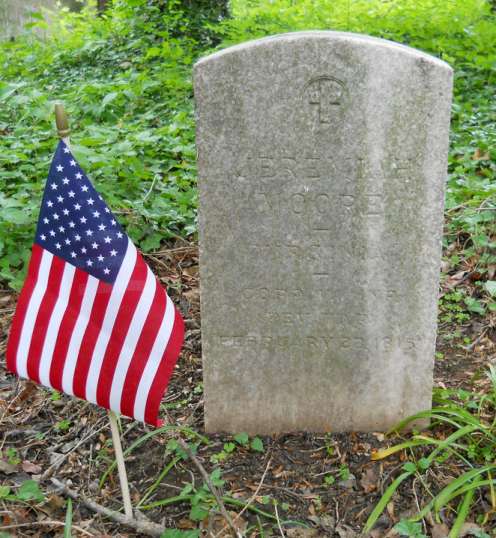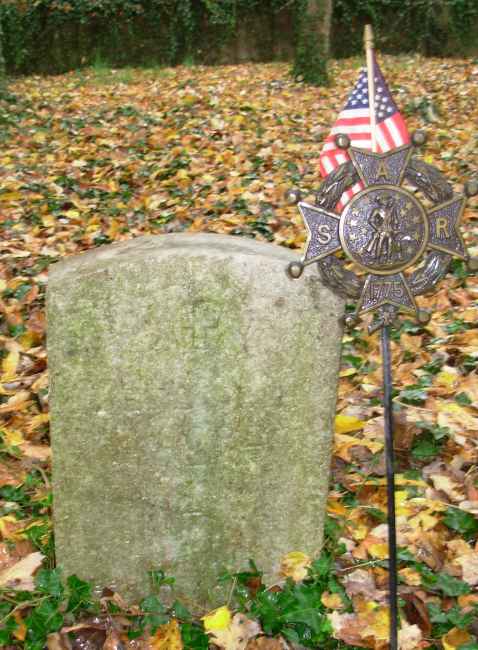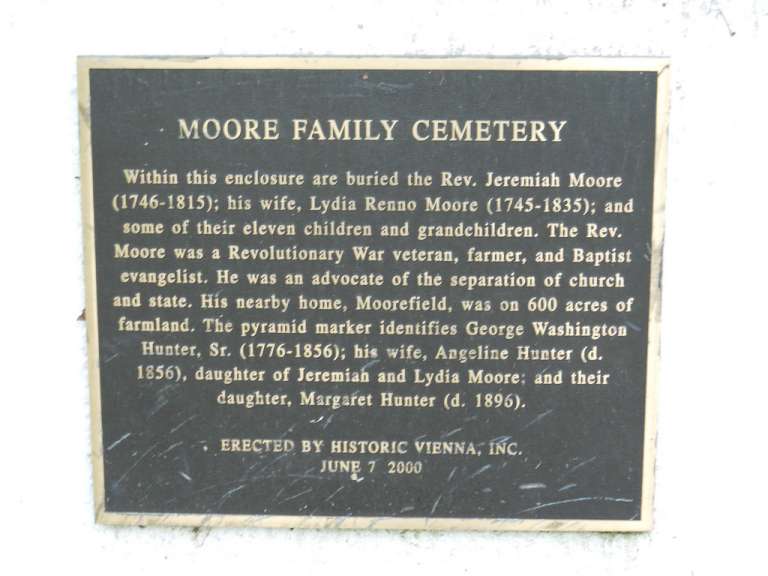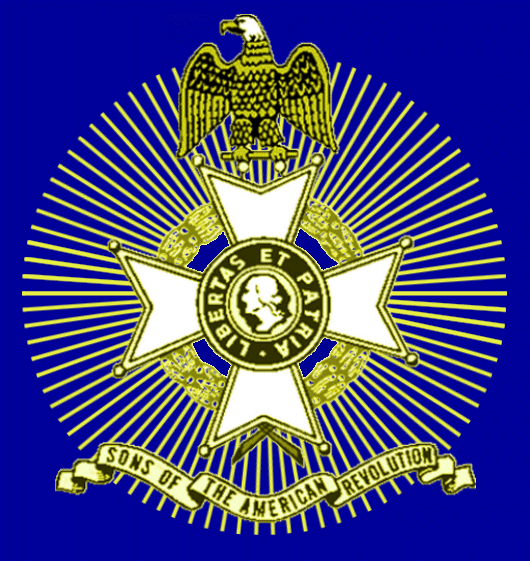The Life and Times of Jeremiah Moore*
by John D. Sinks
If the services of Jeremiah Moore were limited to the military sphere, there would be little for us to say today. Moore received a certificate for L44 s8 pay as a corporal on 12 June 1782. His name is recorded in a register of abstracts of certificates issued at the Auditor’s Office to soldiers of Virginia Continental Line. The certificate does not record his company or regiment, or when he served. The extant muster and pay rolls of particular units of the Virginia Line do not bear his name. We do not know in what battles, if any, he fought. All we know is that he was a Virginia Continental corporal.

Jeremiah Moore Grave Marker
Click to Enlarge
Moore’s service in the cause of the American Revolution went well beyond serving in the army, however. His role in establishing certain principles of our government was far more important than for his exploits with a musket. In this second year of the three year bicentennial of the Bill of Rights, it is especially fitting that we should honor Jeremiah Moore.
Jeremiah Moore was born in Stafford Co., Virginia on 7 June 1746. The names of his parents are not known with certainty, although it is believed that he was the son of William Moore. He received a sound education, and had an unusually strong interest in religious matters. At an early age he became a lay reader in the Episcopal Church. When in his mid-twenties he heard a Baptist Elder, the Reverend David Thomas, preach. Moore was moved to join the Champawamsick Baptist Church in Prince William County. David Thomas said to a friend when he baptized Moore in 1772, “I think I have this day baptized a preacher.
This change is religious affiliation was a no small matter. It caused the estrangement of Moore from many of his former friends and according to one of his sons, even from his parents. William Fristoe, one of Moore’s colleagues at Champawamsick and himself destined to become a Baptist minister, wrote, “Violent opposition to the preaching of the Gospel appeared here, and worship was sometimes prevented by enemies of the same....” At one point Moore was seized by a mob led by two magistrates.
Today we are accustomed to the government ensuring a large measure of religious tolerance. Religious tolerance as we understand it today was an idea whose time had not arrived in Virginia of the early 1770’s. The Episcopal Church had been established as the official church of the colony in Virginia’s Charter in 1606 and its status had been bolstered by a number of Acts of Assembly. The Act of 1642 gives a good picture of the official hostility in colonial Virginia to the so-called “dissenters’:
Whereas many schismatical persons out of their averseness to the orthodox established religion, and out of the new fangled conceits of their own hereticall inventions, refuse to have their children baptized, Be it therefore enacted by the authority aforesaid, that all persons that, in contempt of divine sacrament of baptisme, shall refuse to carry their child to a lawful minister in that county to have them baptized shall be amerced two thousand pounds of tobacco; half to informer and halfe to publique.
Although the Glorious Revolution of 1689 recognized that Protestants did have the right to worship outside the Episcopal Church, licensing remained under government control and was in fact restrictive. Jeremiah Moore was not a licensed minister of the Gospel.
Jeremiah Moore challenged the restrictions on licensing dissenting ministers in 1773 by preaching in Alexandria. He was apprehended at least once and possibly three times. He himself wrote of this in 1808:
I have felt the effects of the ecclesiastical establishment and have been told by the Judge from his seat 'you shall lay in jail until you rot' when my only crime was no other than that of preaching the Gospel of Jesus Christ....
Like other Baptist ministers incarcerated in Virginia, he frustrated the authorities by preaching through the bars of his jail cell. His stand for freedom of religion undoubtedly came to the attention of Fairfax County’s future Revolutionary leaders, including George Washington, George Mason, and Charles Broadwater, all justices of the County Court and vestrymen of the Episcopal Church before the Revolution.
According to one of Moore’s great grandsons, Patrick Henry defended Jeremiah Moore in Court, and Justice Charles Broadwater ordered him released from prison. We have found no contemporary evidence substantiating this claim, however.
The principle of freedom of religion became a fundamental issue in Virginia politics during the Revolution. George Mason included it in the Virginia Declaration of Rights of 1776. The same year a measure of separation of Church and state was attained which the House of Delegates prohibited ministers of the Gospel from sitting in the legislature. The issue, however, was far from settled. Thomas Jefferson drafted a bill guaranteeing freedom of religion in 1783, but legislature took no action. Two years later, when Jefferson was in France, the issue came to a crisis. Not only did Jefferson’s bill come up, but also a proposal was made to levy a tax to pay teachers of the Christian religion. Moore was active in circulating a petition against the tax. Over 10,000 people signed petitions opposing the measure. Not only was the proposed tax defeated, but Jefferson’s bill was passed. Freedom of religion would be protected in Virginia by guarantees of the right of practice a religion of one’s choice, and by a separation of church and state.
Jeremiah Moore remained active in the Baptist Church after the battle to separate church and state in Virginia. He preached from New York to Georgia, and as far west as Kentucky and Tennessee. In 1795, when he was not yet 50 years old, he said that he had travelled far enough preaching to have gone around the globe twice. In 1797 he attended the Ketocton Baptist Association, which recommended a gradual emancipation of slaves. He was active in founding the First Baptist Church of Washington in 1802, the First Baptist Church of Alexandria in 1803, and the Second Baptist Church of Washington in 1810. Attorney General William Wirt reminisced about Moore:
My first favorite preacher in early life was a Baptist. His name was Jerry Moore; and a powerful man he was. Not refined, but rough and strong, of copious and even impetuous volubility, keen, acute, witty, full of original observations, and as a reasoner, I have seldome heard him surpassed. He was a most interesting preacher.
Further evidence of Moore’s ability was the fact that Thomas Jefferson corresponded with him on such diverse topics as the nature of baptism and suffrage.
Jeremiah Moore made out his will when he was sixty-eight years old, on 1 August 1814. It is clear from it that he remained troubled by the institution of slavery. He wrote,
The situation of the laws at present and the state of this unhappy country generally leaves no opportunity to say anything about that part of my family that are slaves by law. I must leave them therefore to the mercy of my children and hope they will do to and for them what is right.
A few months later, on 23 February 1815, Jeremiah Moore died, He is buried here on the grounds of his home, Moorefield. With him is buried his wife, Lydia Reno, daughter of Francis Reno, whom he wed on 1 November 1765.
Jeremiah Moore was a man of strong convictions and unusual courage. Before the Revolution his displayed the courage of conviction to suffer estrangement from his friends and family, and even to go to jail. After the Revolution he took controversial positions on religious liberty and slavery. Moore was successful in his fight for religious freedom. It was the Jeremiah Moores who, through their sermons, letters, and petitions kept the issue of religious freedom before the Jeffersons, Masons, and Madisons.
For Jeremiah Moore the Revolution was not a military conflict which began in 1775 and ended in 1783. It was a conflict of ideas and conscience which could easily have died in the malaise after the Treaty of Paris. Jeremiah Moore was one of those men who kept the Revolution alive.
* This paper is based on a presentation made on Sunday, November 11, 1990 at the Moore Family Cemetery in Vienna on the occasion of the dedication of a Revolutionary Grave Marker by the Fairfax Resolves Chapter, Sons of the American Revolution.

Jeremiah Moore SAR Marker
Click to Enlarge

Moore Familly Cemetery Plaque
Click to Enlarge
Selected Bibliography
Eckenrode, H.J. The Revolution in Virginia. New York, New York: Houghton Mifflin Co., 1916.
Fristoe, William. A Concise History of the Ketocton Baptist Association. Staunton, Va.: William Gilmon Lyford, 1810.
Little, Louis Peyton. Imprisoned Preachers and Religious Liberty in Virginia. Lynchburg, Va.: J.P. Bell Co., 1938.
Malone, Dumas. Jefferson and the Rights of Man. Boston, Ma.: Little, Brown, & Co., 1951.
Moore, William Cabell. “Jeremiah Moore, 1746-1815,” The William and Mary Quarterly, 1933.
Netherton, Nan and Donald Sweig, Janice Artemel, Patricia Hickin, and Patrick Reed. Fairfax County, A History. Fairfax, Va.: Fairfax County Board of Supervisors, 1978.
Prufer, Julius F. “The Franchise in Virginia from Jefferson through the Convention of 1829,” The William and Mary Quarterly, 1927.
Rutland, Robert A. George Mason, Reluctant Statesman. Williamsburg, Va.: Colonial Williamsburg, 1961.
Selby, John E. The Revolution in Virginia. Williamsburg, Va.: The Colonial Williamsburg Foundation, 1988.
Swem, E.G. “The Disqualification of Ministers in State Constitutions,” The William and Mary Quarterly, 1917.
Wertenbaker, Thomas J. Give Me Liberty: The Struggle for Self-Government in Virginia. Philadelphia, Pa.: The American Philosophical Society, 1958.

